
German may sound complicated at first.
It scares off many learners, especially when they listen to people speaking some of its more complicated dialects.
Even as a fluent German speaker, I find it unbelievably hard to understand the Swiss German variety. To this day, I still have to ask if the person can switch to Hochdeutsch (formal German).
But some people, including yourself, may end up managing to get the courage to push past the fear and frustration. Once you do, things will get much easier, especially once you start picking up the essential beginner and intermediate German words.
Words will start to make more sense, and you’ll slowly but surely start to figure out that a lot of German vocabulary consists of compound words with unique meanings. You’ll start getting more and more compliments on your German, and you’ll start to have a better feel for the German sentence structure.
At this stage, you’re a pre-intermediate learner: someone who is past the beginner level and on a steady road to fluency. On your way there, picking up a lot of vocabulary will be key to having meaningful conversations with native speakers on a greater variety of topics. After all, you don’t want to be pausing mid-conversation to ask what a word means!
That’s where this article comes in handy.
We’ve taken the time to put together a list of several intermediate German words by category, accompanied by their English translations. In addition, we’ve broken down some of the best ways to retain and practice new vocabulary so that you can efficiently memorize the words below.
Without further ado, let’s get right into it…
 Table of Contents
Table of Contents
- Large Numbers – große Zahlen
- Nouns – Nomen
- Verbs – Verben
- Adjectives – Adjektive
- Adverbs – Adverbien
- Prepositions – Präpositionen
- Conjunctions – Konjunktionen
- Particles – Partikel
- Conclusion
1. Large Numbers – große Zahlen

One of the first things you should learn as you approach the intermediate level in German is how to form large numbers. This will help you deal with a variety of everyday situations, such as making expensive purchases or telling someone your age.
| English Translation | German Word | Number |
| “ten” | Zehn | 10 |
| “eleven” | elf | 11 |
| “twelve” | zwölf | 12 |
| “thirteen” | dreizehn | 13 |
| “fourteen” | vierzehn | 14 |
| “fifteen” | fünfzehn | 15 |
| “sixteen” | sechzehn | 16 |
| “seventeen” | siebzehn | 17 |
| “eighteen” | achtzehn | 18 |
| “nineteen” | neunzehn | 19 |
| “twenty” | zwanzig | 20 |
| “thirty” | dreißig | 30 |
| “forty” | vierzig | 40 |
| “fifty” | fünfzig | 50 |
| “sixty” | sechzig | 60 |
| “seventy” | siebzig | 70 |
| “eighty” | achtzig | 80 |
| “ninety” | neunzig | 90 |
| “a hundred” | einhundert | 100 |
| “a thousand” | eintausend | 1,000 |
| “ten thousand” | zehntausend | 10,000 |
| “a hundred thousand” | Hunderttausend | 100,000 |
| “a million” | eine Million | 1,000,000 |
2. Nouns – Nomen
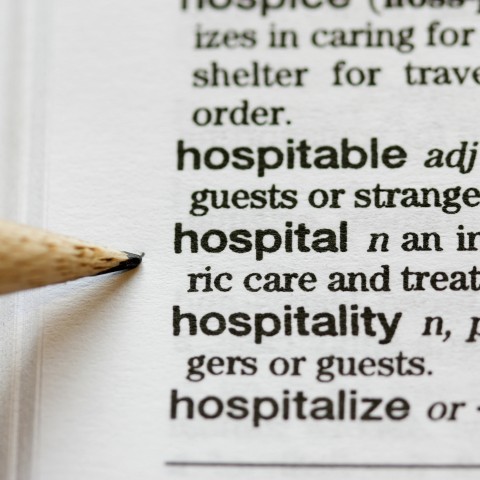
Nouns make up the bulk of our vocabulary, so it’s good for intermediate German learners to pick up as many as they can in different categories.
Time – Zeit
| English Translation | German Word |
| “Century” | Jahrhundert |
| “Morning” | Morgen |
| “Evening” | Abend |
| “Quarter” | Quartal |
| “Semester” | Semester |
Places – Plätze
| English Translation | German Word |
| “Region” | Region |
| “Department” | Abteilung |
| “Village” | Dorf |
| “Park” | Park |
| “Bank” | Bank |
| “Pharmacy” | Apotheke |
| “Hospital” | Krankenhaus |
| “Bakery” | Bäckerei |
| “Cliff” | Klippe |
| “Beach” | Strand |
| “Island” | Insel |
| “Hill” | Hügel |
Technology – Technologie
| English Translation | German Word |
| “Screen” | Bildschirm |
| “Keyboard” | Tastatur |
| “Mouse” | Maus |
| “Tablet” | Tablet |
| “TV” | Fernseher |
| “Console” | Konsole |
| “Charger” | Ladegerät |
| “Website” | Webseite |
| “Account” | Konto |
| “Password” | Passwort |
| “File” | Datei |
| “Folder” | Folder |
| “Software” | Software |
Home – Zuhause
| English Translation | German Word |
| “Room” | Zimmer |
| “Floor” | Fußboden |
| “Living room” | Wohnzimmer |
| “Bathroom” | Bad |
| “Fridge” | Kühlschrank |
| “Wardrobe” | Kleiderschrank |
City & Transportation – Stadt & Verkehr
| English Translation | German Word |
| “Suburbs” | Vorort |
| “Neighborhood” | Nachbarschaft |
| “Highway” | Autobahn |
| “Alley” | Gasse |
| “Roundabout” | Kreisel |
| “Crossroad” | Kreuzung |
People – Menschen
| English Translation | German Word |
| “Uncle” | Onkel |
| “Aunt” | Tante |
| “Grandson” | Enkel |
| “Granddaughter” | Enkelin |
| “Child” | Kind |
| “Grandfather” | Großvater |
| “Grandmother” | Oma |
Body Parts – Körperteile
| English Translation | German Word |
| “Finger” | Finger |
| “Back” | Rücken |
| “Belly” | Bauch |
| “Breast” | Brust |
| “Shoulder” | Schulter |
| “Leg” | Bein |
| “Thigh” | Schenkel |
| “Butt” | Hintern |
| “Foot” | Fuß |
| “Cheek” | Wange |
| “Chin” | Kinn |
| “Forehead” | Stirn |
Food – Essen
| English Translation | German Word |
| “Knife” | Messer |
| “Fork” | Gabel |
| “Spoon” | Löffel |
| “Wine” | Wein |
| “Dish” | Gericht |
| “Appetizer” | Vorspeise |
| “Dessert” | Nachtisch |
| “Drink” | Getränk |
| “Coffee” | Kaffee |
Work & Studies – Arbeit & Studium
| English Translation | German Word |
| “Nurse” | Krankenschwester |
| “Judge” | Richter |
| “Lawyer” | Anwalt |
| “Waiter” | Bedienung |
| “Scientist” | Wissenschaftler |
Clothes – Kleider
| English Translation | German Word |
| “Pants” | Hose |
| “Sweater” | Pullover |
| “T-shirt” | T-Shirt |
| “Shirt” | Hemd |
| “Coat” | Mantel |
| “Socks” | Socken |
| “Shoes” | Schuhe |
| “Dress” | Kleid |
| “Hat” | Hut |
3. Verbs – Verben
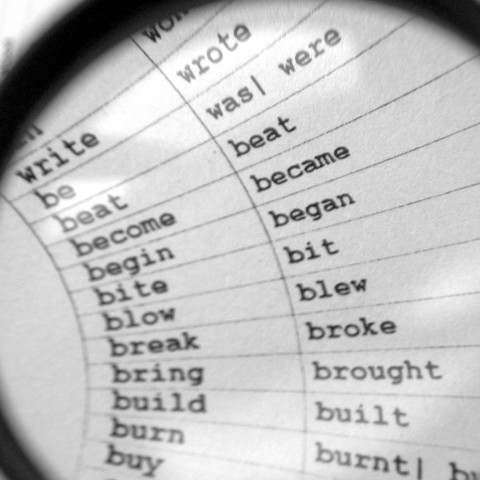
At this point, you already know the most important action words and auxiliaries. To help you level up and expand your vocabulary, here are the essential intermediate German verbs that will allow you to get your point across more accurately.
| German Word | English Translation |
| dienen | “to serve” |
| verlassen | “to leave” |
| erlauben | “to allow” |
| senden | “to send” |
| bekommen | “to get” / “to receive” |
| leben | “to live” |
| anrufen | “to call” |
| erinnern | “to remind” |
| vorstellen | “to introduce” |
| akzeptieren | “to accept” |
| ablehnen | “to refuse” |
| handeln | “to act” |
| spielen | “to play” |
| erkennen | “to recognize” |
| wählen | “to choose” |
| berühren | “to touch” |
| erklären | “to explain” |
| aufstehen | “to get up” |
| öffnen | “to open” |
| schließen | “to close” |
| gewinnen | “to win” |
| verlieren | “to lose” |
| existieren | “to exist” |
| erfolgreich sein | “to succeed” |
| wechseln | “to change” |
| arbeiten | “to work” |
| studieren | “to study” |
| schlafen | “to sleep” |
| gehen | “to walk” |
| versuchen | “to try” |
| stoppen | “to stop” |
| weitermachen | “to continue” |
| kochen | “to cook” |
| gehören | “to belong” |
| riskieren | “to risk” |
| lernen | “to learn” |
| treffen | “to meet” |
| erschaffen | “to create” |
| werden | “to become” |
| betreten | “to enter” |
| beenden | “to exit” |
| anbieten | “to offer” |
| bringen | “to bring” |
| benutzen | “to use” |
| erreichen | “to reach” |
| vorbereiten | “to prepare” |
| hinzufügen | “to add” |
| bezahlen | “to pay” |
| berücksichtigen | “to consider” |
| kaufen | “to buy” |
| drücken | “to push” |
| einkaufen | “to shop” |
| reisen | “to travel” |
4. Adjectives – Adjektive

If nouns and verbs are the bread and butter of language, adjectives are the honey. These words add a bit of flavor and personality to your speech, allowing you to give vivid descriptions of the world around you. Below are a few German adjectives to get you started.
| German Word | English Translation |
| genial | “awesome” |
| schrecklich | “horrible” |
| seltsam | “weird” |
| kompliziert | “complicated” |
| dick | “thick” |
| dünn | “thin” |
| nah | “near” |
| weit | “far” |
| eng | “narrow” |
| breit | “wide” |
| sanft | “soft” |
| hart | “hard” |
| voll | “full” |
| leer | “empty” |
| leicht | “light” |
| schwer | “heavy” |
| einzigartig | “unique” |
| besonders | “special” |
| neu | “new” |
| alt | “old” |
| arm | “poor” |
| reich | “rich” |
| sauber | “clean” |
| dreckig | “dirty” |
| schwach | “weak” |
| stark | “strong” |
| schlank | “slim” |
| fett | “fat” |
| süß | “cute” |
| bedeutend | “important” |
| komisch | “funny” |
| nett | “nice” |
| glücklich | “happy” |
| traurig | “sad” |
| ruhig | “calm” |
| aufgeregt | “excited” |
| gefährlich | “dangerous” |
| langweilig | “boring” |
| würzig | “spicy” |
| zweiter | “second” |
| nächster | “next” |
| bisheriger | “previous” |
| vorletzter | “second-to-last” |
| orange | “orange” |
| rosa | “pink” |
| grau | “gray” |
| lila | “purple” |
| magenta | “magenta” |
| türkis | “turquoise” |
5. Adverbs – Adverbien

Adverbs help us give more apt descriptions of how (or to what extent) something was done. Here are just a few of the more common German adverbs for you:
When – Wann
| German Word | English Translation |
| schon | “already” |
| vor langer Zeit | “a long time ago” |
| jetzt | “now” |
| nochmal | “again” |
| zu guter Letzt | “at last” |
| dann | “then” |
| danach | “thereafter” |
How Often – Wie Oft
| German Word | English Translation |
| manchmal | “sometimes” |
| selten | “rarely” |
| in der Regel | “usually” |
| allgemein | “generally” |
| die ganze Zeit | “all the time” |
Where – Wo
| English Translation | German Word |
| “nowhere” | nirgends |
| “somewhere” | irgendwo |
| “elsewhere” | anderswo |
| “up” | oben |
| “down” | unten |
| “over” | über |
| “under” | unter |
| “far” | weit |
How – Wie
| English Translation | German Word |
| “quietly” | leise |
| “slowly” | langsam |
| “quickly” | schnell |
| “calmly” | ruhig |
| “easily” | leicht |
| “luckily” | glücklicherweise |
| “simply” | einfach |
How Much – Wie Viel
| German Word | English Translation |
| genug | “enough” |
| insbesondere | “especially” |
| fast | “almost” |
| wie viel | “how much” |
| so viele | “so many” |
| so wenig | “so few” |
| über | “about” |
6. Prepositions – Präpositionen
The next set of words we’ll add to your intermediate German vocabulary are prepositions.
Time – Zeit
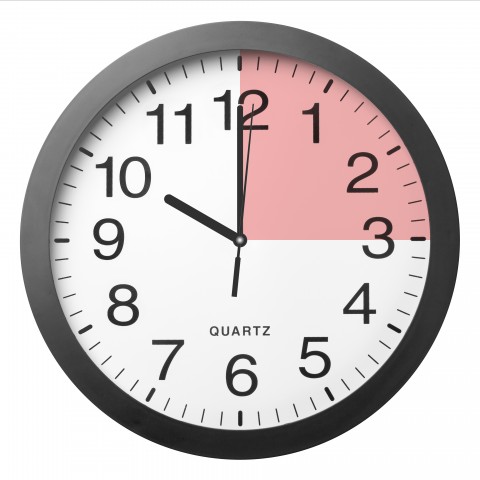
| English Translation | German Word |
| “before” | vor |
| “after” | nach dem |
Space – Raum
| English Translation | German Word |
| “next to” | neben an |
| “to the right” | nach rechts |
| “to the left” | nach links |
| “at” | beim |
| “in front of” | vor dem |
| “behind” | hinter |
| “under” | unter |
| “over” | über |
Other – Andere
| German Word | English Translation |
| zwischen | “between” |
| dank an | “thanks to” |
| trotz | “despite” |
| ohne | “without” |
| mit | “with” |
7. Conjunctions – Konjunktionen
| German Word | English Translation |
| weder… noch… | “neither… nor…” |
| so / also | “so” |
| andernfalls | “otherwise” |
| da | “since” (as) |
| wenn | “when” |
| deshalb | “therefore” |
8. Particles – Partikel
To conclude our list, let’s look at a few German particles that are used for affirmation, negation, and intensification.
Affirmation
| German Word | English Translation |
| aber | “but” |
| ja | “yes” |
| wohl | “well” |
Negation
| German Word | English Translation |
| auf keinen fall | “no way” |
| niemals | “never” |
Intensification
| German Word | English Translation |
| schon | – |
| mal | – |
| nun | “well” |
| denn | – |
9. Conclusion
Herzlichen Glückwünsch! (“Congratulations!”)
You should now have a pretty good idea about intermediate German particles, conjunctions, prepositions, adverbs, and more.
Without these words as your weapons, you’d struggle to cross that intermediate learner mark!
Want to make sure you memorize as many words as possible?
Enter flashcards.
Flashcards are a proven language learning tool for effective memorization. In case you’re interested, there are dedicated apps and online tools for this technique. On GermanPod101.com, for example, you get automatic access to your own customizable flashcard decks. Don’t have the time to manually add all of your target words? Don’t fret! We also provide ready-to-go flashcard decks for learners at every level.
What else can our website offer you?
- Customizable vocabulary tools (wordlists, vocab builders, and more)
- Slowed-down audio
- Line-by-line breakdowns
- Voice recording tools for pronunciation comparison
Moreover, GermanPod101 has vetted professional, native-speaking German language experts to work with you. They can help you create a personalized learning program and assist you with any questions you may have concerning the German language.
Our platform hosts thousands of written, audio, and video lessons on more topics than you could imagine, all explained and designed by language experts. These lessons will help you make the most of your study time, as they’re based on proven learning methods that guarantee results.
The great news is that GermanPod101 is available on both mobile devices (iPhone/Android) and your desktop browser. All you need to do is sign up for free at GermanPod101.com and take it from there.
Viel Spaß beim Lernen!
Happy learning!

German Animal Names: The Ultimate Vocabulary List

Germany is a big country with tons of diversity and an expansive territory.
You can take a swim in the North Sea at Germany’s island of Sylt, go skiing in the Bavarian Alps, or even check out Berlin’s East Side Gallery to see some murals from the post-WWII era.
All of this and more makes Germany an appealing country to visit as a tourist, especially thanks to the country’s abundance and variety of nature.
One of the most appealing elements of nature—and life in general—is animals. Picking up a few German animal names before your visit is sure to enhance your experience, especially if you plan to spend some time in the great outdoors.
Even if you never set foot in Germany, learning these basic words will take your German-language skills up a notch and maybe even help you see the world through a fresh set of eyes. After all, many animals are rather similar to us: they have emotions, they survive, and they have many of the same essential needs as we do.
To help you build your animal vocabulary and limit how often you resort to English, we’ve compiled this masterlist of words for animals in German.
Without further ado, let’s get right into it…
 Table of Contents
Table of Contents
- At Home (Pets)
- On the Farm (Farm Animals)
- In the Wild / Forest / Safari (Land Animals)
- In the Ocean (Aquatic / Marine Animals)
- Bugs and Insects
- Birds
- Reptiles & Amphibians
- Animal Body Parts
- Animal-Related Idioms and Slang Expressions
- Conclusion
1. At Home (Pets)

Cats are the #1 pet of choice in Germany. In fact, a mere 22 percent of households in Germany are home to more than 14 million cats in total. (Dogs are a close second!)
Not only is Germany pet-friendly, but the treatment they give to their pets is simply outstanding. Yet, if you’re a foreigner (especially from outside the European Union) planning to move to Germany with your pet, you’ll want to make sure you become familiar with the legal procedures.
All pets are tax-exempt in Germany, except for non-rescue dogs. For these, you’ll have to pay a Hundesteuer every year.
Here’s a list of nine at-home pet names in German:
| Katze | “Cat” |
| Hund | “Dog” |
| Hamster | “Hamster” |
| Kaninchen | “Rabbit” |
| Maus | “Mouse” |
| Ratte | “Rat” |
| Meerschweinchen | “Guinea pig” |
| Goldfisch | “Goldfish” |
| Papagei | “Parrot” |
2. On the Farm (Farm Animals)

Germany is one of the most developed countries in terms of agriculture, and 80% of the country’s total land is used for forestry and agricultural activities.
Germany is known for its fast adoption of technology in agriculture, as it’s replacing more and more farm workers with machinery over time.
With the great significance agriculture carries in Germany, you never know when the need may arise for some animal vocabulary. Below, you’ll find the names of a few farm animals in German to get you started.
| Kuh | “Cow” |
| Schwein | “Pig” |
| Schaf | “Sheep” |
| Ziege | “Goat” |
| Pferd | “Horse” |
| Huhn | “Chicken” |
| Henne | “Hen” |
| Hahn | “Rooster” |
| Gans | “Goose” |
| Ente | “Duck” |
| Truthahn | “Turkey” |
3. In the Wild / Forest / Safari (Land Animals)

Germany hosts several beautiful national parks, most notably the Bavarian Forest National Park and the Eifel National Park. Considering that 2% of Germany’s territory is covered by wilderness, there are more than enough options to satisfy adventurers and nature lovers.
Your adventures are bound to be more interesting when you could stumble upon wolves, foxes, boars, and a number of other wild animals on your trek!
- → Intrigued by wildlife? Then head over to our video lesson on forest animal vocabulary to learn more useful words for wild animals in German!
| Bär | “Bear” |
| Wolf | “Wolf” |
| Hirsch | “Deer” |
| Hase | “Hare” |
| Fuchs | “Fox” |
| Igel | “Hedgehog” |
| Eichhörnchen | “Squirrel” |
| Eber | “Boar” |
| Murmeltier | “Groundhog” |
| Löwe | “Lion” |
| Tiger | “Tiger” |
| Jaguar | “Jaguar” |
| Panther | “Panther” |
| Elefant | “Elephant” |
| Giraffe | “Giraffe” |
| Affe | “Monkey” |
| Gorilla | “Gorilla” |
| Känguru | “Kangaroo” |
| Koala | “Koala” |
| Panda | “Panda” |
| Faultier | “Sloth” |
| Robbe | “Seal” |
| Pinguin | “Penguin” |
| Eisbär | “Polar bear” |
| Walross | “Walrus” |
4. In the Ocean (Aquatic / Marine Animals)

Germany is mostly landlocked, but it does border two large bodies of water up north:
- the North Sea (Nordsee) to the West
- This is Europe’s most significant shipping lane and a major fishing source for Western Europe.
- the Baltic Sea to the East
There are also a variety of lakes (such as Lake Constance [Bodensee] and Chiemsee) that are home to beautiful marine animals and fish.
Here’s a list of 12 aquatic animals in German and English to get you started:
| Fisch | “Fish” |
| Hai | “Shark” |
| Delfin | “Dolphin” |
| Wal | “Whale” |
| Seelöwe | “Sealion” |
| Qualle | “Jellyfish” |
| Tintenfisch | “Octopus” |
| Seepferdchen | “Seahorse” |
| Seeigel | “Urchin” |
| Seestern | “Starfish” |
| Muschel | “Mussel” |
| Seegurke | “Sea cucumber” |
5. Bugs and Insects

Over the last 30 years, more than 75% of total flying insect mass has disappeared from German skies. These numbers are not unheard of in other countries, and they should sound an alarm to us humans that we ought to become more environmentally aware.
While it does not help the environment, less bugs and insects in the sky does mean less trouble to deal with. This would guarantee better sleep than what you would get in, say, Indonesia or another tropical country—especially if you like to camp or keep the windows open at night.
With that being said, there are several situations where knowing some German vocabulary to describe bugs and insects could come in handy. That’s why we’ve compiled this list of 12 bugs and insects in German along with their English translations:
| Biene | “Bee” |
| Wespe | “Wasp” |
| Moskito | “Mosquito” |
| Fliege | “Fly” |
| Spinne | “Spider” |
| Heuschrecke | “Grasshopper” |
| Kakerlake | “Cockroach” |
| Schmetterling | “Butterfly” |
| Ameise | “Ant” |
| Motte | “Moth” |
| Schnecke | “Snail” |
| Nacktschnecke | “Slug” |
You can also hear and practice the pronunciation of different bugs and insects on our website!
6. Birds
Birds are arguably some of the most beautiful animals. They come in a rich variety of body types and colors, and there are endless species to enjoy.
Like with pets, Germany is a very nice country for birds. It is home to several bird protection organizations, and there is continuous collaboration with the European Union for the same purposes.
| Möwe | “Seagull” |
| Krähe | “Crow” |
| Adler | “Eagle” |
| Taube | “Dove” |
| Eule | “Owl” |
| Elster | “Magpie” |
| Spatz | “Sparrow” |
| Pfau | “Peacock” |
7. Reptiles & Amphibians
Reptiles are always an interesting topic to talk about, especially when we’re talking about the more dangerous species (think black mambas!).
Germany may not be well-known for its reptiles and amphibians, as Australia and Southeast Asian countries would definitely beat it in this department. But in reality, the country is large and diverse enough to host a good variety of species. For example, you can spot wall lizards in Stuttgart, European pond turtles in Geisenheim, and sand lizards in Dotzheim.
Below is a short list of reptiles and amphibians in German for you to review:
| Frosch | “Frog” |
| Kröte | “Toad” |
| Krokodil | “Crocodile” |
| Eidechse | “Lizard” |
| Schildkröte | “Turtle” |
| Meeresschildkröte | “Sea turtle” |
| Schlange | “Snake” |
8. Animal Body Parts
Detail is important, and a good animal description should never lack it.
We’ve compiled a list of animal body parts to help you describe your favorite animals:
| Schwanz | “Tail” |
| Haar | “Hair” |
| Pelz | “Fur” |
| Zahn | “Tooth” |
| Fangzahn | “Fang” |
| Klaue | “Claw” |
| Horn | “Horn” |
| Huf | “Hoof” |
| Feder | “Feather” |
| Flügel | “Wing” |
| Schnabel | “Beak” |
| Mund | “Mouth” |
| Flosse | “Fin” |
| Tentakel | “Tentacle” |
| Mähne | “Mane” |
| Kofferraum | “Trunk” |
| Stoßzahn | “Tusk” |
| Fühler | “Antenna” |
| Bein | “Leg” |
| Schuppe | “Scale” |
| Kieme | “Gill” |
9. Animal-Related Idioms and Slang Expressions
Now that you’ve acquired a good bit of German animal vocabulary, you may enjoy finding creative ways to put these words to use. Here are several idioms and slang expressions in German that mention animals:
| Da wird ja der Hund in der Pfanne verrückt. “The dog in the pan is going crazy.” | That’s enough to drive you round the bend! |
| Jemanden einen Bären aufbinden. “To untie someone a bear.” | To lead someone up the garden path. |
| Ein blindes Huhn findet auch ein Korn. “A blind chicken happens to find corn too.” | A blind hen happened to find a grain. |
| Die Katze im Sack kaufen. “To buy a cat in a bag.” | To buy a pig in a poke. |
| Mit dir habe ich noch ein Hühnchen zu rupfen. “I still have a chicken to pick with you.” | I still have an axe to grind with you. |
| Du benimmst dich wie ein Elefant im Porzellanladen. “You act like an elephant in a porcelain shop.” | Like a bull in a china shop. |
| Das geht auf keine Kuhhaut. “It doesn’t fit on a cow’s skin.” | It beggars description. |
| Mein Name ist Hase, ich weiß von nichts. “My name is Hare, I know nothing.” | I have no clue. / I have nothing to do with that. |
| Da steppt der Bär. “There the bear steps.” | The mood is great there. |
| Du hast doch ‘nen Vogel. “You have a bird.” | You are insane. |
| Alles für die Katz. “Everything for the cat.” | It was all a waste of time. |
Want to spice up your German a little more? Then head over to our vocabulary list Essential Idioms That Will Make You Sound Like a Native Speaker and our lesson Some of the Most Common Slang Expressions in Germany.
10. Conclusion
There you have it. You have now learned tons of information about wildlife in Germany, and you’re ready to hold a conversation about its most ferocious and beautiful animals. To practice, let us know the name of your favorite animal in German!
Feel like you want even more practice? Are you struggling to create your own sentences and hold comfortable conversations in German?
An efficient learning resource might be what you’re looking for.
That’s where GermanPod101 comes in.
With thousands of audio, video, and text lessons, GermanPod101 is a comprehensive resource that learners of all levels (beginner, intermediate, or advanced) can rely on.
What makes GermanPod101 effective is the integrations that make our program work. Lessons come with cheat sheets and transcripts, and you can use tools for line-by-line breakdowns, pronunciation comparison, online flashcards, and even more. With our MyTeacher service, you can also study 1-on-1 with a native-speaking German language expert.
Don’t just take my word for it. Go to GermanPod101.com and try it all for yourself.
Signup is free and straightforward, and no credit card is required.
Viel Spaß beim Lernen!
Happy learning!

30+ German Phone Call Phrases

Remember the last time you had to make an important call?
When you had that shaky feeling in your chest…the one you get right after you hear the ring on the other end?
Or maybe you’re one of those gifted people who can screw up their courage and take it easy.
While we’re slowly ditching what used to be the main function of telephones—voice calling—for things like texting and Facebook, there are still moments when we need to pick up the phone.
This in mind, language learners will still benefit from memorizing a few German phone call phrases in today’s SMS-based world. While in Germany, you’ll have to order food from a new favorite restaurant, call the local barbershop for a reservation, or phone your boss with an urgent question.
Things that are socially challenging in your own language become even more intense when a foreign language like German is involved!
To make your life easier, GermanPod101 has put together a list of more than 30 phrases for phone calls in German. We’ve also included conversation examples to give you a better idea of how to use them and to help you become an effective communicator over the phone.
Let’s dig in…
 Table of Contents
Table of Contents
- Picking up the Phone
- Saying Who You Are
- Stating the Reason for Your Call
- Asking to Speak to Someone
- Asking Someone to Wait
- Leaving a Message
- Asking for Clarification
- Ending the Phone Call
- Sample Phone Conversations
- Conclusion
1. Picking up the Phone

To get started, let’s look at a few different ways you can answer a phone call in German. Remember that the greeting you use will depend on whether the call is formal or casual in nature.
If you’re talking to a friend, use this:
Hello.
Hallo.
And if you’re talking to an unknown or formal caller, then use one of the next expressions:
[Last name] at the telephone.
[Last Name] am Apparat.
[Last name].
Good morning!
Guten Morgen!
Good day!
Guten Tag!
Good evening!
Guten Abend!
Such a phone call might proceed as follows:
A: Schmidt.
B: Guten Tag Frau Schmidt.
A: “Schmidt.”
B: “Good day Mrs. Schmidt.”
2. Saying Who You Are
The next thing you’ll want to do is introduce yourself. This is rather formal in German, especially when talking to a stranger or someone with whom you have a formal relationship. Here’s the most ideal expression to use:
This is [name].
Hier spricht [Name].
Literally, the phrase above translates to: “Here speaks [name].”
If you’re receiving a call from a customer or someone at work, use the following expression:
This is [name], from [company].
Hier Spricht [Name] von [Firma].
3. Stating the Reason for Your Call

This is the most crucial part of your phone call. Not knowing what to say here will make your call pretty much pointless. Before you get on the phone or expect a call, make sure you rehearse this part to make it easier for whoever is on the other end.
If you’re calling to make a certain request, use the following phone call phrase:
I’m calling to ask… / confirm… / make a reservation.
Ich rufe an, um zu fragen … / zu bestätigen … / eine Reservierung vorzunehmen.
Need help with something in particular? Use this expression:
I’d like to speak to someone about…
Ich würde gerne mit jemandem über… sprechen.
If you missed someone’s call, you can call back and say:
I’m calling back, because someone tried to reach me from this number.
Ich rufe zurück, da jemand versucht hat, mich von dieser Nummer zu erreichen.
4. Asking to Speak to Someone

When asking to speak to someone—such as a friend via their home phone number or an individual in a specific position via their company’s fixed telephone number—the following expressions will come in handy.
May I speak to…?
Kann ich mit… sprechen?
Is [name] there?
Ist [Name] da?
5. Asking Someone to Wait
Waiting in line can get very frustrating, especially when it’s a matter of urgency. Therefore, it’s crucial for you to master the necessary stay-on-the-line expressions in German:
Let me check quickly.
Lassen Sie mich kurz nachschauen.
I’ll put you on hold for a second.
Ich werde Sie für eine Sekunde in die Warteschleife legen.
I’ll transfer you to the right office. Stay on the line please.
Ich werde Sie mit dem richtigen Büro verbinden. Bleiben Sie bitte in der Leitung.
6. Leaving a Message

Voicemail among friends and family is slowly becoming obsolete. But in business, it’s still relevant and very important for urgent calls.
Here are three expressions you can use to leave a message next time you have to make a business phone call in German:
Please let him know…
Bitte sagen Sie ihm…
Can I leave a message?
Kann ich eine Nachricht hinterlassen?
Can you tell him to call me back at [phone number]?
Können Sie ihm sagen, er soll mich unter [Telefonnummer] zurückrufen?
7. Asking for Clarification
Asking for clarification is especially relevant when you’re at that beginner stage, or if you often face network issues that might interrupt your call.
Sorry, could you say that again?
Entschuldigung, können Sie das noch einmal sagen?
I’m sorry, but I’m having a hard time hearing you. I think there’s a bad connection.
Es tut mir leid, aber ich kann Sie kaum hören. Ich glaube die Verbindung ist schlecht.
Could you spell your name for me, please?
Könnten Sie bitte Ihren Namen buchstabieren?
Just to double check…
Nur um sicher zu gehen…
Lit. “Just to make sure…”
You can also ask your caller if they speak English, just in case:
Do you speak English?
Sprechen Sie Englisch?
8. Ending the Phone Call

Whether your call went well or not, it’s always worth leaving a nice impression at the end.
Anything else I can help with?
Kann ich sonst noch helfen?
You’ve been very helpful. Thank you.
Sie waren sehr hilfreich. Vielen Dank.
See you on (day) at (time).
Wir sehen uns am (Tag) um (Zeit).
Have a great day.
Ich wünsche ihnen einen wunderschönen Tag.
9. Sample Phone Conversations
To give you a better idea of how a phone conversation in German might go, we’ve included two sample dialogues for you: one informal and one formal.
Informal phone conversation
Two friends are setting up a time to meet for lunch on a weekend. Here is a short conversation they’ve had on the phone.
Paul: Hallo.
Marie: Hallo.
Paul: Hello.
Marie: Hello.
Paul: Wie geht’s dir?
Marie: Gut. Ich lerne für eine Prüfung. Und dir?
Paul: How are you doing?
Marie: Good. I’m studying for an exam. How about you?
Paul: Mir geht es gut, danke. Ich lese ein Buch.
Marie: Schön.
Paul: I’m good, thanks. I’m reading a book.
Marie: Nice.
Paul: Bist du am Wochenende in der Stadt?
Marie: Ja, hast du irgendwelche Pläne?
Paul: Are you in town on the weekend?
Marie: Yes, you have any plans?
Paul: Wollen wir zusammen Lunch essen?
Marie: Ja, warum nicht! Wann genau?
Paul: Should we have lunch together?
Marie: Yeah, why not! When exactly?
Paul: Samstag Nachmittags?
Marie: Können wir uns gegen 14:00 Uhr treffen?
Paul: In the afternoon.
Marie: Could we meet around two p.m.?
Paul: 15 Uhr wäre besser.
Marie: Hört sich gut an.
Paul: I prefer three p.m.
Marie: Sounds good.
Paul: Bis dann!
Marie: Bis dann, tschüss!
Paul: See you!
Marie: See you, bye!
Formal phone conversation
After they set the time and place, one of the friends calls the restaurant to reserve a table. Here is an example of a short phone conversation for this situation.
Paul: Guten Tag!
Rezeptionistin: Hamburgs Hamburger – Guten Tag!
Paul: Good day!
Receptionist: Hamburg Hamburgers – Good day!
Paul: Ich möchte einen Tisch für zwei Personen reservieren.
Rezeptionistin: Für wann möchten Sie reservieren?
Paul: I would like to reserve a table for two.
Receptionist: For when would you like to reserve?
Paul: Ich würde gerne für Samstag reservieren.
Rezeptionistin: Gerne, wie viel Uhr?
Paul: I’d like to reserve a table for Saturday.
Receptionist: Surely, what time?
Paul: 15 Uhr, bitte.
Rezeptionistin: Samstag, 15 Uhr, zwei Person. Auf welchen Namen?
Paul: Three in the afternoon, please.
Receptionist: Saturday, three p.m., two people. And what’s your name please?
Paul: Paul Schmidt.
Rezeptionistin: Perfekt, Herr Schmidt. Bis Samstag!
Paul: Paul Schmidt.
Receptionist: Perfect, Mr. Schmidt. See you on Saturday!
10. Conclusion
And there you go.
You’re now all set to start taking and making phone calls in German like a boss. How confident are you? Are there any phrases or situations you’d still like to learn before your next all-German call?
As long as you let your interlocutor know that you’re not a native speaker, a few basic sentences to get the point across will do.
You’ll have people speak to you in slower-than-usual German, and that’ll make it easier for you to understand.
You should also rehearse what you have to say for different conversations, as this will help you get more and more comfortable with phone convos.
Not convinced you can pull that off easily?
Then you might want to grasp a few more German words before making that phone call.
For that, I recommend checking out GermanPod101.
Here, you can find pretty much all the lessons you might need to go from beginner to advanced.
In fact, our system is equipped with some of the most effective language learning techniques. This includes features like pronunciation comparison, slowed-down German audio, online flashcards, slideshows, and more.
All of these features and more are incorporated within a proven learning system. This ensures that you learn the language in the shortest amount of time possible.
You also get access to dedicated tutors who can answer your questions and help explain any German rules or words you might be struggling with.
Take advantage of GermanPod101’s free trial and check it all out for yourself. No credit card required.

200+ Basic German Words for Beginners

If you’ve just started learning German, you might be struggling to get past the beginner stage.
Maybe you feel overwhelmed by the Germanic umlauts on vowels (ä, ö, ü), or maybe that eszett letter (ß). Perhaps it’s the pace of spoken German that’s made you question your decision to start learning.
While there’s definitely truth to those concerns, worry not. There are several short and easy-to-learn words in German that can serve as a springboard while you become familiar with the language.
Memorizing even a few basic German words for beginners will be enough of a stepping stone to help you eventually learn more. This is because many German words are composed of several shorter words that, when combined, have a unique meaning.
Take Kühlschrank, for example. This word is composed of Kühl- which means “cool,” and -schrank which translates to “cupboard.”
Combine the two and you get “cool cupboard,” which is a funny way to describe a refrigerator—the actual meaning of the word Kühlschrank.
Pretty relieving to know this, right?
German isn’t that hard after all. The most difficult part is to summon up the courage to begin.
That’s why we took the time to put together a categorized masterlist of the most essential words in German for beginners.
Without further ado, let’s get right into it…

 Table of Contents
Table of Contents
1. Pronouns
The first set of words you should add to your German vocabulary are pronouns. These are the words we use to refer to people, places, or things without actually using their names:
- Susan ate the chocolate bar. = She ate the chocolate bar.
Here, we’ll be covering three types of pronouns in German: personal, demonstrative, and interrogative.
Personal Pronouns
We’ll start with personal pronouns, given their importance in sentences. These are crucial for almost any sentence, and we recommend you memorize them by heart before you start with any other words.
| English | German |
| I | ich |
| you | du |
| he | er |
| she | sie |
| it | es |
| we | wir |
| you (plural) | ihr |
| they | sie |
| me | mich / mir |
| you | dich / dir |
| him | ihm / ihn |
| her | ihr |
| us | uns |
| them | ihnen |
Demonstrative Pronouns
Demonstrative pronouns are especially critical for indicating which objects or people you’re referring to in your dialogue. These four basic German words are important to master at the beginner stage.
| English | German |
| this | dieses |
| that | das |
| these | diese |
| those | jene |
Interrogative Pronouns / Question Words
Interrogative pronouns, or the “Five Ws,” are the words we use to ask questions.
| English | German |
| who | wer |
| whom | wen / wem |
| whose | wessen |
| what | was |
| which | welche |
In a similar vein, there are a few interrogative adverbs you should learn at this stage as well:
| English | German |
| when | wann |
| where | wo |
| why | warum |
| how | wie |
2. Numbers

The numbers from one to ten in German are rather similar to those in English. Just like with most languages, learning the first ten digits will help you understand and easily learn the rest of the numbers.
| Numbers | English | German |
| 0 | zero | null |
| 1 | one | eins |
| 2 | two | zwei |
| 3 | three | drei |
| 4 | four | vier |
| 5 | five | fünf |
| 6 | six | sechs |
| 7 | seven | sieben |
| 8 | eight | acht |
| 9 | nine | neun |
| 10 | ten | zehn |
3. Nouns
Nouns are one of the most important parts of speech, so you should memorize as many of them in German as you can. When used with verbs, they create a complete sentence—in a pinch, you can even use them alone to get an urgent point across! Below, you’ll find lists of beginner German nouns you should focus on right away.
Time
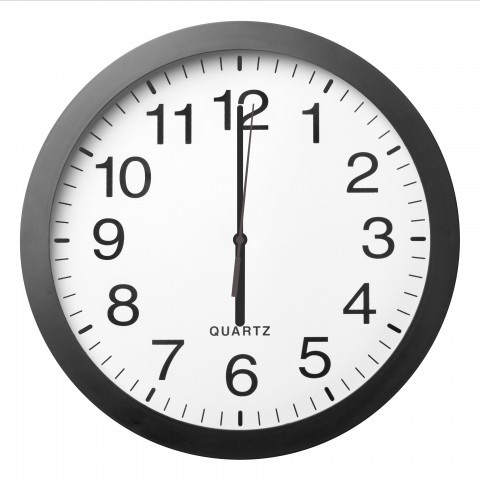
Time is king, especially in a country like Germany where punctuality is paramount. Learning time-related vocabulary will come in handy in your day-to-day interactions.
| English | German |
| hour | Stunde |
| minute | Minute |
| morning | Morgen |
| afternoon | Nachmittag |
| evening | Abend |
| day | Tag |
| month | Monat |
| year | Jahr |
| Monday | Montag |
| Tuesday | Dienstag |
| Wednesday | Mittwoch |
| Thursday | Donnerstag |
| Friday | Freitag |
| Saturday | Samstag |
| Sunday | Sonntag |
People
These are the words you’d learn in the first lesson of probably any German beginner copybook.
| English | German |
| butcher | Metzger (m.) / Metzgerin (f.) |
| woodman | Holzfäller (m.) / Holzfällerin (f.) |
| police officer | Polizist (m.) / Polizistin (f.) |
| doctor | Arzt (m.) / Ärztin (f.) |
| nurse | Krankenpfleger (m.) / Krankenschwester (f.) |
| firefighter | Feuerwehrmann (m.) / Feuerwehrfrau (f.) |
| teacher | Lehrer (m.) / Lehrerin (f.) |
| father | Vater |
| mother | Mutter |
| sister | Schwester |
| brother | Bruder |
| Mr. | Herr |
| Ms. | Frau |
Places Around Town

If you’re traveling in Germany, whether in one town or around the country, these words will help you get by and even ask for directions.
| English | German |
| hospital | Krankenhaus |
| supermarket | Supermarkt |
| school | Schule |
| downtown | Innenstadt |
| university | Universität |
| city hall | Rathaus |
| main square | Hauptplatz |
| bank | Bank |
| museum | Museum |
| restaurant | Restaurant |
| café | Café |
| police station | Polizeistation |
| train station | Bahnhof |
| bus station | Bushaltestelle |
School/Office Essentials

If you have to study or work in Germany, these words will be helpful when you’re in class or at the office.
| English | German |
| pen | Kugelschreiber |
| notebook | Notizbuch |
| computer | Computer |
| pencil case | Federmappe |
| headphones | Kopfhörer |
| mouse | Maus |
| keyboard | Tastatur |
| wifi | WLAN |
| charger | Ladegerät |
| cable | Kabel |
| backpack | Rucksack |
| desk | Schreibtisch |
| copybook | Heft |
Body Parts
| English | German |
| eye | Auge |
| nose | Nase |
| ear | Ohr |
| face | Gesicht |
| arm | Arm |
| chest | Brust |
| cheek | Wange |
| forehead | Stirn |
| mouth | Mund |
| chin | Kinn |
| armpit | Achselhöhle |
| abdomen | Bauch |
| leg | Bein |
| toe | Zeh |
| finger | Finger |
| ankle | Knöchel |
| hip | Hüfte |
| forearm | Unterarm |
| elbow | Ellbogen |
| wrist | Handgelenk |
Food
Germans are proud of their cuisine and German culture values eating healthy, fresh food rather than buying frozen or ready-to-eat meals. Here’s a list of words for your next grocery shopping spree.
| English | German |
| ٍٍvegetables | Gemüse |
| fruit | Obst |
| meat | Fleisch |
| milk | Milch |
| egg | Ei |
| coffee | Kaffee |
| yogurt | Joghurt |
| bread | Brot |
| bacon | Speck |
| pie | Kuchen |
| ham | Schinken |
| chicken | Huhn |
| juice | Saft |
| sausage | Wurst |
4. Verbs
As a beginner in German, you’ll greatly benefit from picking up the most commonly used verbs. Learning them together with nouns will give you a headstart when it comes to forming sentences and communicating with others.
Daily Routine Verbs
If you’re into daily journaling, doing that in German will require you to know a set of daily routine-related verbs. Here’s a list to get you started:
| English | German |
| to get up | aufstehen |
| to eat | essen |
| to drink | trinken |
| to go | gehen |
| to work | arbeiten |
| to study | studieren |
| to drive | fahren |
| to ride | reiten |
| to sleep | schlafen |
| to wake up | aufwachen |
| to hang | hängen |
| to do laundry | Wäsche machen |
| to nap | ein Nickerchen machen |
| to work out | trainieren |
| to go out | ausgehen |
| to prepare | vorbereiten |
| to cook | kochen |
| to clean | putzen |
| to wash | waschen |
| to tidy up | aufräumen |
| to connect | verbinden |
| to communicate | kommunizieren |
| to wear | tragen |
| to warm up | aufwärmen |
| to grab | greifen |
| to mix | mischen |
| to hold | halten |
| to freeze | einfrieren |
| to change | wechseln |
| to move | bewegen |
Other Common Verbs
| English | German |
| to give | geben |
| to get | bekommen |
| to do | tun |
| to make | machen |
| to let | lassen |
| to ask | fragen |
| to smile | lächeln |
| to find | finden |
| to use | benutzen |
| to take | nehmen |
| to come | kommen |
| to look | schauen |
| to hear | hören |
| to smell | riechen |
| to talk | sprechen |
| to exit | gehen |
| to call | rufen |
| to feel | fühlen |
| to answer | antworten |
| to laugh | lachen |
| to cry | weinen |
| to steal | stehlen |
| to run | rennen |
| to walk | gehen |
| to meet | treffen |
| to create | erschaffen |
| to finish | beenden |
5. Adjectives
Using adjectives in your speech or writing can add a layer of meaning and help you better express yourself. To get you started, here are a few beginner German adjectives in different categories.
Describing Objects
| English | German |
| big | groß |
| small | klein |
| long | lang |
| short | kurz |
| round | rund |
| rectangular | rechteckig |
| smooth | glatt |
| rough | rau |
Describing People
| English | German |
| pretty | hübsch |
| handsome | gutaussehend |
| tall | groß |
| short | klein |
| disgusting | ekelhaft |
| sociable | kontaktfreudig |
| funny | lustig |
| beautiful | schön |
| lovely | lieblich |
| caring | fürsorglich |
| selfless | selbstlos |
| arrogant | arrogant |
| humble | bescheiden |
| courageous | mutig |
| weak | schwach |
| strong | stark |
| quirky | schrullig |
Describing Emotions
Being able to describe our own emotions is critical for well-being and also helps us better understand others. Here’s a list of adjectives for describing emotions:
| English | German |
| happy | glücklich |
| sad | traurig |
| joyful | freudig |
| angry | sauer |
| depressed | depressiv |
| anxious | ängstlich |
| stressed out | gestresst |
| jolly | fröhlich |
Describing Weather
| English | German |
| rainy | regnerisch |
| wet | nass |
| humid | feucht |
| dry | trocken |
| arid | dürr |
| cool | kühl |
| frigid | kalt |
| foggy | neblig |
| windy | windig |
| stormy | stürmisch |
| breezy | luftig |
| windless | windstill |
| calm | ruhig |
6. Conjunctions
| English | German |
| and | und |
| but | aber |
| then | dann |
| because | weil |
| so | so / also |
7. Others
Below is a short list of filler words that Germans use in their conversations. Using these will make you sound like a native and they’ll come in handy in many situations.
| English | German |
| I see (sudden understanding) | ach so |
| sure | klar |
| simply | halt |
| well | tja |
| already | schon |
8. Conclusion
Armed with these German beginner words, you’ll be able to understand even more of the spoken language than you may have thought (thanks to those nifty word combinations!). How many of these words were new to you? And how many did you know already? We look forward to hearing from you in the comments!
As you read more German, pay attention to how different words are composed. You’ll often notice they can be broken down into parts, which will help you derive their meanings more easily.
Your goal should be to learn around 1000 German words; statistically, that’d cover 85.5% of all words you hear.
In other words, if you learn 1000 words, you’ll be able to speak German almost fluently. You’ll only have issues expressing yourself 14.5% of the time.
Memorize the 200+ from our list, and you’ll only be 800 words away from fluency.
Wondering where and how to learn those other 800 words?
Buckle up and head to GermanPod101.com.
Here, you can access lessons and word lists for the most important day-to-day vocabulary. Our lessons all feature the most effective learning tools, such as flashcards, slideshows, slowed-down audio, line-by-line breakdowns, and more.
You can also opt for 1-on-1 guidance from a language expert to answer your questions. Your private tutor can even give you a personalized learning program to match your learning goals.
You can get all of this and more by signing up for free on the GermanPod101 website.
No credit card or unnecessary information required.
Sign up here and access our materials from your desktop or mobile phone.

German Filler Words: Speak Deutsch Like a Native

Imagine if everything in language was straightforward and perfect.
Like, literally.
No typos. No jokes. No slang.
Just everyone meaning business.
It wouldn’t be much fun, would it?
The imperfections found in languages, dialects, and communication in general are what make them fun.
We all like to communicate clearly, but that never allows for any awkward, unforeseen, or weird moments—moments which could be pretty funny, if you think about it.
Knowing how flawed our communication is, we try our best to hide our imperfections.
As a learner of the language, you can do this well by using German filler words.
 Table of Contents
Table of Contents
- What are filler words and why do we use them?
- The Top 10 German Filler Words
- Pros and Cons of Filler Words
- Conclusion
1. What are filler words and why do we use them?
Before we introduce you to the most common filler words in German and show you how to use them to your advantage, let’s cover the basics.
A- What are filler words?

Filler words, or Füllwörter as the Germans call them, are the expressions we use to avoid pauses and fill in gaps during our day-to-day conversations. They could be something as short as an “uh,” “err,” or “okay,” or as long as an “in my opinion” or “I think that.”
While some filler words do have meanings of their own, they’re not typically used to express those meanings in this context. Rather, they mostly serve as sentence connectors that we don’t even notice when saying or hearing them.
Whether you’re a fan of filler words or not, they have invaded every language and people use them even in professional contexts.
B- Why do we use them?
The psychology behind filler words is worth a pretty long discussion, but for the purposes of this article, we’ll just discuss a few ideas on the topic.
We want to be polite.

Most of us don’t want to come across as rude. While being direct is arguably a great approach, a bit of politeness can go a long way.
That’s where filler words come in.
If you call a support team asking for a service they refuse to provide, it would seem very rude if they just said “No!” Instead, they use filler words such as “Uhm…” or “I’m afraid that…” or “Unfortunately…” to make it sound more polite than just a plain rejection.
We want to be understood.

Everyone wants their opinion heard, and more than that, everyone wants to be understood.
Whether you’re teaching a subject, giving a conference, or consulting someone, it’s easy to get carried away with your ideas and to forget that you’re communicating with a human and not a machine.
This is one big reason why filler words are so popular.
They help us formulate our ideas well, and to present them in a fashion and speed that’s easily absorbed by others.
We want to lie or deceive.

Obviously, not everyone that uses filler words is doing so to lie or deceive, but scientists have observed patterns in conversation filler overuse that suggest dishonesty is one reason people use fillers. This is especially evident when the idea in question could be communicated easily without the use of filler words, or when someone delays answering a yes-or-no question by using unnecessary words.
2. The Top 10 German Filler Words
Now that you have some additional context regarding filler words, it’s time for you to begin studying the top 10 German conversation fillers. Feel free to practice using them right away!
1 – Also (So)
This filler word is used to transition from one sentence or clause to another.
Example #1
Also, wann können wir uns treffen?
“So, when can we meet?”
Example #2
Also, wie alt bist du?
“So, how old are you?”
2 – Eigentlich (Actually)
This is one of the most unnecessarily used German filler words, similar to “actually” in English.
Example #1
Was nervt Sie eigentlich in Deutschland am meisten?
“What actually annoys you most in Germany?”
Example #2
Ich kann eigentlich nichts.
“I can’t actually do anything.”
3 – Stimmt. (That’s right.)
Example #1
Stimmt. Ich habe es auch nicht gesehn.
“That’s right. I didn’t see it either.”
Example #2
Stimmt. Es dauert zu lange.
“That’s right. It takes too much time.”
4 – Bestimmt (Definitely)
Example #1
Das ist bestimmt nicht so schlecht.
“That’s definitely not that bad.”
Example #2
Ich werde es bestimmt essen.
“I’ll definitely eat it.”
5 – Ach so (I see)
Germans throw in an ach so when any existing confusion has been cleared. It signals a sudden understanding.
Example #1
Person 1: Nein, es war im Kühlschrank.
Person 2: Ach so.
Person 1: “No, it was in the fridge.”
Person 2: “I see.”
Example #2
Ach so, ich dachte du sagtest etwas anderes.
“I see. I thought you said something else.”
6 – Klar (Sure)
Klar is used to express agreement in German.
Example #1
Klar, nimm dir Zeit.
“Sure, take your time.”
Example #2
Klar, was machst du so?
“Sure, what are you doing?”
7 – Halt (Simply)
Here’s another filler in German that’s used far more than necessary. It has no real meaning (a rough equivalent would be “simply”) and people use it in a variety of contexts.
Example #1
Geh halt zur Schule!
“(Simply) go to school!”
Example #2
Ich kann halt nichts tun.
“I (simply) can’t do anything.”
8 – Tja (Well)
Example #1
Tja, ich wusste es.
“Well, I knew it.”
Example #2
Tja, das kann ich tun.
“Well, I can do that.”
9 – Schon (Already)
Schon means “already,” but it’s frequently used as a filler word with pretty much no meaning.
Example #1
Das wusste ich schon.
“I knew that already.”
Example #2
Das ist schon etwas sonderbar.
“That’s a bit strange.”
10 – Doch (Nevertheless)
Doch is one of those words that give German learners a hard time. While it doesn’t have a clear meaning, it’s used to counter negative statements. That makes “nevertheless” the closest translation to it. Here are two examples:
Example #1
Person 1: Bist du nicht!
Person 2: Bin ich doch!
Person 1: “You’re not!”
Person 2: “I am!”
Example #2
Person 1: Mein Chef will mich befördern.
Person 2: Das ist doch gut!
Person 1: “My boss wants to promote me.”
Person 2: “But that’s good!”
3. Pros and Cons of Filler Words
Filler words may seem insignificant, but how (and how often) you use them contributes to shaping people’s opinions about you. People might make judgements on your confidence, talkativeness, social skills, or even personality based off of how you use conversation fillers.
In the sections below, we’ve thoroughly illustrated some of the top pros and cons of using filler words, as well as how you can substitute them.
A- Pros of Using Filler Words

You sound more natural.
Filler words can give you a more natural, approachable tone. In fact, not using filler words at all might cause you to sound robotic or even arrogant, which would probably not help with your social life, especially in day-to-day, informal conversations.
You sound friendlier.
People will feel more drawn to you when you use filler words. You’ll sound more familiar, and people are more comfortable with people who behave similarly to them.
Note that this may not be the case in a more formal context, such as a business meeting. Sometimes you have to cut out all the flim-flam and get straight to the point, which leads us to the next section.
B- Cons of Using Filler Words

You’re considered hesitant.
Imagine you’re in a business meeting with a German company and you start throwing a bunch of tja’s into your speech. It would sound a bit off, wouldn’t it?
It would actually give the impression that you’re a bit hesitant and unsure of what you’re talking about. Therefore, consider halting or minimizing your usage of filler words in business meetings and other formal contexts. You don’t want to leave a bad impression, especially with Germans.
You’re perceived as having low self-confidence.
Remember how kids in primary school would always make fun of that one kid with a stuttering problem? Even if that kid was strong physically or mentally, the others would neglect and look down upon him.
The same concept—but on a smaller scale—applies to adults when they use a lot of unnecessary filler words. People perceive it as a sign of low self-confidence and might proceed to disrespect or ignore that person.
Therefore, to command more respect in your relationships, especially if you’re in a leading role, it’s crucial that you pay attention to how frequently you use filler words.
C- How to Substitute Filler Words
Feeling like you can’t really let go of all those conversation fillers? Well, we have a great alternative.
“Silence speaks when words can’t.”
That’s right. The best alternative to filler words is silence. Whether you’re not sure about the next sentence or want to reword your last one, you can take your time to formulate your ideas and just remain silent throughout that short period.
It may sound weird to the people around you when you start doing that, but it’ll slowly become more and more familiar.
Consequently, it’ll help you command more respect and trust, especially at work and other professional environments.
4. Conclusion
And, congratulations!
You’ve now learned what most early German learners don’t.
You now have the ability to understand and use filler words. You shouldn’t be surprised if Germans start to seem even more impressed with your German now.
Which of these words was your favorite? Which ones do you use most in your own language?
If you’re thinking about expanding your skills even more, create your free lifetime account on GermanPod101.com today. Whether you want to learn how to order food, how to pronounce German umlauts, or just understand more German in general, we have your back.
We provide a full range of lessons covering all levels of German. With us, you can go from beginner to master with a minimal time investment.
Thanks to GermanPod101’s proven learning systems, you can sign up for free today and get access to thousands of audio, video, and text lessons on any topic you might be looking for.
You can also take advantage of several easy-to-use features like word lists, flashcards, slideshows, a voice-recording tool, slowed-down audio, and more.
No catch. No credit card. No nonsense.
Sign up now and see everything for yourself.
Viel Spaß beim Lernen!
Happy learning!

Express Your Love in German: Go Beyond ‘Ich Liebe Dich…’

“If you talk to a man in a language he understands, that goes to his head. If you talk to him in his own language, that goes to his heart.“
Makes sense, right?
When dating a German, it’s easy to get comfortable speaking to your partner in only English, especially as Germany classifies as one of the best non-native English-speaking countries.
While this can help you keep a good line of communication, it can easily start to feel a little superficial for your German-speaking partner. From time to time, your relationship could benefit from expressing your love in German, their mother tongue.
Speaking your partner’s native language will go right to their heart, and that will make it easier for you to build a connection with them in the long term…especially if that’s the language you flirt in. 😉
Convinced yet? Here are some German love phrases to get you started.
 Table of Contents
Table of Contents
- Confess Your Affection: Pick-Up Lines and More
- Fall in Deeper: “I Love You,” and More
- Take it One Step Further: “Will You Marry Me?” and More
- Endearment Terms
- Must-Know Love Quotes
- Conclusion
1. Confess Your Affection: Pick-Up Lines and More

All great things take time. But guess what? They probably won’t be handed to you on a silver platter, no matter how long you wait. Your best bet is to get out there and take chances. This especially applies to building (romantic) relationships. Below is a list of German love phrases to help you get your foot in the door.
You are pretty.
Du bist hübsch.
This is a phrase I’ve always stumbled upon while scrolling through friendly comments on social media pictures. Want to let someone know they’re easy on your eyes? No word is better than hübsch.
You are attractive.
Du bist attraktiv.
If you’re looking for an easy way in, this is a simple one to remember due to its similarity to the English equivalent.
Do you want to go out with me?
Willst du mit mir ausgehen?
If you’re willing to go out on a date, this sentence is your best bet to get the other person onboard.
Do you want to be my girlfriend / boyfriend?
Willst du mit mir gehen?
This phrase literally means, “Do you want to walk with me?” but it’s the perfect choice if you’re not sure whether you’ve achieved official relationship status with your crush.
Thank you for the great evening.
Danke für den tollen Abend.
After a great date night, there’s no better way to end the evening than by expressing your gratitude towards your date.
It was wonderful seeing you.
Es war schön dich zu sehen.
This works perfectly for a short date, like a walk after work or after leaving a group of friends.
You mean so much to me.
Du bedeutest mir so viel.
As you progress through the dating process and notice that there’s attraction between you two, feel free to throw in a romantic line like this one. It should be enough to get your date excited about getting to know you even more!
2. Fall in Deeper: “I Love You,” and More

If you’re dating a German, it may take quite some time to get to this stage, as Germans like to take their time to get to know their date. Your safest bet is to express your deeper emotions only after you’ve gotten enough signs from your partner that your relationship is more exclusive. Here are six romantic German phrases to take your relationship from “casual date” to “lover.”
I love you.
Ich liebe dich.
If you’re a German learner, you’ve probably already stumbled upon this sentence in a beginner’s textbook or on a language app. This one is enough to break the ice and announce to your partner that you’re ready to take things up a notch.
I love you.
Ich hab(e) dich lieb.
Unleashing your emotions to a beloved family member or close friend? Enters Ich hab’ dich lieb. Culturally, this expression is perceived as ambiguous when compared to Ich liebe dich.
It’s worth noting that while this phrase could also be used with your date, it may be considered friendly rather than romantic.
I can’t stop thinking about you.
Ich kann nicht aufhören an dich zu denken.
This is the perfect sentence to drop a hint to your partner, especially if you’re worried about having your initiative rejected. If your partner reciprocates or shows a positive sign after hearing this, you’re probably on the right track to something big!
I miss you.
Ich vermisse dich.
Thinking about another date? Use this expression to see if your partner wants to meet again. Who knows? Maybe your next date will be the stepping stone to a more serious relationship.
You are my only love.
Du bist meine einzige Liebe.
Germans love to be direct, and what better way to match that than to just drop your feelings on the table and let your date know how special they are to you?
You give meaning to my life.
Du gibst meinem Leben einen Sinn.
If you’ve happened to gain more perspective on life after meeting your date, chances are they’re contributing well to that. Let them know!
3. Take it One Step Further: “Will You Marry Me?” and More

Now that your relationship has had time to evolve and you’ve spent many months or years together, why not just tie the knot already? Below are six love phrases in German to help you do just that.
Note: If you’re a man, it’s customary to ask a woman’s father for permission before you move forward with your marriage.
I want you to be my husband / wife.
Ich will, dass du mein/e Mann / Frau wirst.
This expression is perfect for making a short and sweet proposal to your partner. Be sure you have that ring in hand’s reach before saying this!
I want to spend the rest of my life with you.
Ich möchte den Rest meines Lebens mit dir verbringen.
Considering you’re about to marry a German, you probably already understand the power of directness in German culture. No better way to propose than to make it plain and clear who you want to spend the rest of your life with.
Will you marry me?
Willst du mich heiraten?
If you’re planning to get down on one knee, this should be your go-to sentence.
I want to have grandchildren with you.
Ich möchte mit dir Enkelkinder haben.
You’re planning children with your partner? Why not take it a step further and show him/her that he or she is the one you’ll be with forever?
I want to be with you forever.
Ich will immer bei dir sein.
You are my one and only.
Du bist mein Ein und Alles.
We are destined for each other.
Wir sind füreinander bestimmt.
The last three expressions are ideal for use by women to hint at their enduring interest, as men are the party expected to propose.
4. Endearment Terms

How better to keep that spark of romance (and fun!) alive than with an adorable pet name or two? Here are some cute and romantic German endearment terms you can consider:
Darling
Liebling
Not only can you use this term for your other half, but you can also use it for your children (or even pets)!
Sweetheart
Schatz
This is the most common German endearment term. Its literal meaning is “treasure” and it’s popular among lovers of all ages. Other variations, like Schätzchen (diminutive of Schatz), could be used as well.
Little bear
Bärchen
This is one of many German terms of endearment derived from animal names. It’s perfect for a cuddling session and can be used for both men and women. It’s the diminutive form of Bär (bear).
Bunny
Hase
Another animal term, this one could be alternated with a diminutive as well: Häschen.
Mouse bear
Mausebär
This is a funny mix of “bear” and “mouse”—two animal names you could even use separately to flirt with your partner.
Pearl
Perle
Because this term isn’t popular throughout all of Germany, you’ll probably be the first one to ever use it with your partner.
5. Must-Know Love Quotes

Love conquers all.
Liebe überwindet alles.
Love is blind.
Liebe ist blind.
Jealousy is a passion that passionately seeks what causes pain.
Eifersucht ist eine Leidenschaft, die mit Eifer sucht, was Leiden schafft.
When you sow love, joy will grow.
Wo man Liebe sät, da wächst Freude.
Opposites attract.
Gegensätze ziehen sich an.
Couples comprised of people from different backgrounds enjoy using this quote. It signifies how one can lead a successful relationship despite differences in culture, language, habits, and more. It’s great to use if you want to make sense of your relationship.
The way to a man’s heart is through his stomach.
Liebe geht durch den Magen.
Craving some homemade Bratwurst with a side of Sauerbraten? Your partner will probably not take long to get that (and more) for you after you use this quote.
6. Conclusion
Now that you’re all set with all sorts of German love phrases to impress your date, you can consider taking your German to the next level. Which phrase was your favorite? Are you ready to try it out on the love of your life?
It would sound even more native-like if you could use your chosen endearment terms and love phrases along with some prepositions.
It would be even more impressive if you could create your own sentences, which you can easily do by learning some basic German verbs and just six personal pronouns to incorporate into your sentences.
Wondering where you can find the best resource to learn that and more about the German language?
Enter GermanPod101.
With thousands of methodical audio, video, and text lessons, you’ll be able to interact in many real-life German conversations, whether it’s with your partner or with people in general.
All of this content is taught via a proven system using top learning techniques. You’ll have slowed-down audio to ease your understanding of new words, line-by-line breakdowns of texts, and voice recording tools to master pronunciation.
All of this and more comes with a free sign-up. No catch, no credit card.
Sign up now and get ready to impress your German date!

Negation in German: How to Form Negative Sentences

Are you a people-pleaser? Someone who goes out of their way to make others happy and can’t say no to anyone?
Of course, learning a language is all about developing new skills, embracing new experiences, and accepting challenges…so you’ll probably be saying yes quite a lot. Yet, you still need to know how to say no if you want to master the German language!

In this article, we’ll look at negation in German. You’ll learn how to make negative sentences, how to answer a yes-or-no question correctly, and how to politely decline an offer or invitation…without making anyone upset.
Sure, saying no isn’t easy for some of us. But I assure you it will be (at least from a language-learning point of view!), after you’ve read this.
Let’s waste no more time then, and look at how to form negatives in German!
 Table of Contents
Table of Contents
- Negative Sentences
- How to Answer with a No
- Other Useful Negative Expressions
- How Our Website Can Help
1. Negative Sentences
A negative sentence is one stating that something is false. In English, for example, we create these by adding the word “not” after a helping verb (do, have, be, etc.).
- Dave is not happy.
- We did not go to work today.
There are three main German negation words. The first one, as you might have guessed, is nein, which means “no.” To construct a negative sentence, however, we use two different words: nicht (not) and kein (not a / not… any / no).
Let’s have a look at how to negate sentences in German using these words.
A- When to Use Nicht
In German negation, nicht is used to negate verbs, nouns (including proper nouns like Maria, John, etc.), adjectives (including possessive adjectives), and adverbs.
Have a look at the examples below:
- With a VERB:
Wir warten nicht.
We are not waiting.
- With a NOUN that has a definite article (der, die, or das – “the”):
Ich kenne diesen Film nicht.
I don’t know this movie.
- With a PROPER NOUN:
Sie heißt nicht Mikaela.
Her name’s not Mikaela.
- With an ADJECTIVE:
Ich bin nicht fertig.
I am not ready.
- With a POSSESSIVE ADJECTIVE:
Das ist nicht meine Tasche.
That’s not my bag.
- With an ADVERB:
Er spielt nicht gut Fußball.
He does not play football well.
B- Where to Put Nicht
As you’ve probably noticed, nicht does not always appear in the same place within a sentence. There are a couple of things to remember when using it, so as to make sure you place it correctly in relation to other elements.
In a simple sentence, nicht goes at the end, after the verb.
- Wir warten nicht.
We are not waiting.
However, we rarely speak like that in everyday life, so let’s see how the behavior of nicht changes according to what you’re negating.

Get out of the bathroom, we are not waiting any longer.
It usually goes before an adjective or adverb, unless we’re talking about an adverb of time (e.g. später [later], früher [earlier], gestern [yesterday], morgen [tomorrow]), in which case nicht comes after the adverb.
- Das Essen schmeckt nicht gut.
The food doesn’t taste good.
- Sie kann heute nicht kommen.
She can’t come today.
We place nicht before prepositions:
- Er kommt nicht aus Bamberg.
He does not come from Bamberg.
C- When to Use Kein
Sometimes, you’ll have to use kein (instead of nicht) to form a negative sentence. Remember, kein can be translated as “not a…”, “not… any” or “no.”
Kein has to agree with the noun it describes, and it functions in the same way as the forms of the indefinite article ein.
We use kein in two ways, always with nouns. You can use it to negate a noun that has an indefinite article, or to negate a noun that has no article:
- Ich habe keine Geschwister.
I have no siblings.
- Sie haben keine Hausaufgaben.
They don’t have any homework. (Literally: They have no homework.)
2. How to Answer with a No
There are two types of questions: open-ended and close-ended. A close-ended question (Entscheidungsfragen in German) is usually one you can answer with a “yes” or a “no,” without having to give any other explanation.
In English, we usually say: “Yes, I do.” / “No, I don’t.”
In German, you could just say ja (yes) or nein (no), but you can also learn some more expressions to make your speech sound more natural. It’s common, for example, to give an explanation of why you’re saying no. This is also true in English, of course, and it’s more a matter of common sense than one of grammar or language rules!
To go with your negative responses, you could learn expressions like:
- Tut mir Leid. (I am sorry.)
- Leider (unfortunately / regrettably)
Another fun German way of saying “no” is the colloquial word nee, which is widely used at all levels of society. It’s a nice way of saying nein (which would sound quite rude on its own), without having to give any explanations!
- Hast du Hunger? (Are you hungry?)
Nee. (Nah.)
A second alternative to the formal nein is the colloquial word nö. This would not sound rude to a German speaker, and it’s considered a friendly way to say “no.”
- Triffst du dich heute mit Johannes? (Are you meeting Johannes today?)
Nö. (Nope.)

A: Are you hungry? / B: Absolutely not.
On the other hand, you can use the following phrases to say “Absolutely not!”
- Auf gar keinen Fall.
Under no circumstance. - Überhaupt nicht.
Definitely not. - Absolut nicht.
Absolutely not.
Doch in German
Actually, there’s another way of answering close-ended questions in German that we haven’t mentioned yet: Doch.
While studying the language, you might have noticed that doch and ja both mean “yes” in German…but they’re used in different ways. As you know, ja is the usual word for “yes” and is the opposite of “no” (nein).
- Kommst du mit? (Are you coming?)
Ja. (Yes.)
When do we use doch, then? Doch is used when answering a negative question with a yes, or to contradict a negative statement:
- Kommst du nicht mit? (Aren’t you coming?)
Doch! (Yes [on the contrary], I am!)
- Du bist nicht intelligent. (You aren’t intelligent.)
Doch. (Yes [on the contrary], I am.)

The game is on. Aren’t you coming?
Doch can also be used with a similar meaning as the English word “indeed,” to stress a contrast or a certainty.
- Hast du das gemacht? (Did you do it?)
Ich habe es doch gemacht. (Indeed, I did do it.)
3. Other Useful Negative Expressions
If you want to sound like a native, have a look at some of the most common expressions used in negative sentences.
Did you know, for example, that there are two ways of saying “never”? They are nie and niemals. These two words are interchangeable, but nie is more commonly used. If you use these words, you won’t need to use nicht or kein.

I don’t understand anything.
Some other words that you’ll find useful in negative sentences are:
- A- Noch nicht
This means “not yet” and can also be used for more emphasis:
Ich bin noch nicht fertig.
I’m not finished yet.
- B- Nichts
This means “nothing” or “not anything”:
Ich verstehe nichts.
I don’t understand anything. (Literally: I understand nothing.)
- Niemand and Nirgendwo
These respectively mean “no one” and “nowhere.” Niemand needs to change according to the case, while nirgendwo always stays the same.
Niemand hat mir geholfen.
No one helped me.
Ich kann das Auto nirgendwo sehen.
I can’t see the car anywhere.
- C- Weder…noch
This means “neither…nor” and it works the same way as in English:
Er spricht weder Englisch noch Deutsch.
He speaks neither English nor German.
Again, unlike in some other languages (like Italian), in German we do not do “double negation.” So if you use these words, you will not need to repeat the words nicht or kein.
Here are the positive/negative pairs of the words we’ve just seen. Knowing how to recognize and use them correctly will be a big step in your language-learning journey.
- etwas / alles—nichts (something/everything—nothing)
- jemand—niemand (somebody/anybody—nobody)
- irgendwo—nirgendwo / nirgends (somewhere—nowhere)
- immer / oft / manchmal—nie / niemals (always / often / sometimes—never)
- mit—ohne (with—without)
4. How Our Website Can Help
If you want to learn more German vocabulary and grammar, make sure you check out GermanPod101.com. Here, you’ll find all the content you need to make your language learning journey as interesting and as pleasant as possible.
Practice your listening skills with podcasts and audio lessons, build your vocabulary with word lists and key phrases, and learn useful strategies for learning German more efficiently.
If you want to learn German in order to travel in Germany and other European countries, don’t miss our travel Survival Course. Knowing the language will help you be safe during your trip abroad, and being able to communicate with the locals in their native tongue will make your adventures even more unforgettable…
I hope that you’ll be able to say YES! to all their invitations and offers…but, well, at least now you know how to say “no” properly without sounding rude!
And, if you’re studying German for work or study, make the commitment and start using our member-only features to gain access to the best available German content. The resources available will make learning German feel like a walk in the park, and you’ll be able to reach your language-learning goals in no time at all!
Before you go, we would love to hear from you. How did this article help you? Is there anything about negation in German you’re still unsure about? We’ll do our best to help!

German Tenses: All You Need to Know

First of all, what is a verb?
Together with nouns, verbs are the most important part of any sentence. They’re words that we use to describe actions (singen – to sing), states of being (existieren – to exist), or occurrences (entwickeln – to develop). They have to agree with the subject, which represents who or what is performing the action.
Basically, every type of sentence requires a verb to be complete. This is why it’s so important to give them due attention when learning a foreign language—especially German! Today, we’ll talk about German tenses and how to correctly apply them to verbs.

German verbs are one of the most challenging aspects of learning this beautifully complex language, but don’t worry. We’ll have a look at the main rules you need to know in order to use German verbs with no problems!
In particular, we’ll look at the main verb tenses in German and how to conjugate them for both regular and irregular verbs.
Does this all sound a bit complicated? Don’t worry. We’ll try to explain each concept thoroughly in the following paragraphs. By the time you finish reading, you’ll know how to form German tenses, when to use each one, and more!
 Table of Contents
Table of Contents
1. The Use of Tenses in German
The tenses of a verb are used to express when an action takes place, so they make all the difference when talking about the three concepts of present, past, and future.
In the German language, there are six main verb tenses:
1. Present (Präsens)
2. Present perfect (Perfekt)
3. Past simple (Imperfekt/Präteritum)
4. Past perfect (Plusquamperfekt)
5. Future (Futur I)
6. Future perfect (Futur II)
Let’s look at each of these tenses in more detail with examples of how to conjugate them.

2. Present
The present tense, or Präsens in German, is the most used of all the German verb tenses. It can be used to talk about present actions or future actions that have already been determined. This tense can actually be used to express concepts in three equivalent English tenses: the present, the present continuous, and the future (“will” and “going to” constructions).
We use the German Präsens to express…
- …a fact or condition in the present, or an action that takes place in the present.
Das ist Andreas.
That’s Andreas.
- …an action that takes place repeatedly or never takes place at all.
Jeden Montag geht er zum Fußballtraining.
He goes to football training every Monday.
- …an action that gives information on the duration of something. (Note that in this case, English uses the present perfect.)
Er spielt schon seit zwei Jahren Fußball.
He’s been playing football for two years.
- …a future action that is already determined to happen. (In English, we can use the future or the present.)
Nächste Woche hat seine Mannschaft ein wichtiges Spiel.
His team will have an important match next week.

To conjugate regular verbs in the present tense, we simply remove the infinitive ending -en and add the following endings according to the subject:
| Personal Pronoun | Present Tense Ending | Conjugation of Lernen (To Learn) |
| Ich (I) | -e | ich lerne |
| Du (You) [s] | -st | du lernst |
| Er / Sie / Es (He / She / It) | -t | er / sie / es lernt |
| Wir (We) | -en | wir lernen |
| Ihr (You) [p] | -t | ihr lernt |
| Sie (They) | -en | sie lernen |
Remember, however, that verbs can be irregular. This is the case for two of the most used verbs in German: sein (to be) and haben (to have). Have a look at the table below to see their conjugation in the present tense:
| Personal Pronoun | Sein (To Be) | Haben (To Have) |
| Ich (I) | bin | habe |
| Du (You) [s] | bist | hast |
| Er / Sie / Es (He / She / It) | ist | hat |
| Wir (We) | sind | haben |
| Ihr (You) [p] | seid | habt |
| Sie (They) | sind | haben |
3. Past
To convey events that happened in the past, we have three available tenses in German: the simple past, the present perfect, and the past perfect. Let’s look at when to use these and how to conjugate them!
A- Simple Past
In German, the simple past tense is usually referred to as Imperfekt or Präteritum, and it’s mainly used in writing. The majority of speakers prefer to use the present perfect instead, unless they’re trying to be formal or are telling a story. All the same, knowing this tense will be extremely useful if you want to be able to read books, magazines, and newspapers in German.
All regular German verbs in the simple past follow the same pattern, so once you learn it, you’ll be able to conjugate all of them!
To form the Präteritum, just remove the ending -en and add the following endings according to the subject:
| Personal Pronoun | Simple Past Tense Ending | Conjugation of Lernen (To Learn) |
| Ich (I) | -te | ich lernte |
| Du (You) [s] | -test | du lerntest |
| Er / Sie / Es (He / She / It) | -te | er lernte |
| Wir (We) | -ten | wir lernten |
| Ihr (You) [p] | -tet | ihr lerntet |
| sie/Sie (They) | -ten | sie lernten |
Of course, there are still irregular verbs that do not follow this pattern—you’ll just have to recognize them and memorize their endings by heart! Don’t worry, though: with time and practice, this will come as second nature!
Here’s a table with the conjugations of sein (to be) and haben (to have) in the simple past tense. These verbs are often used not only in writing, but also in speaking.
| Personal Pronoun | Simple Past of Sein (To Be) | Simple Past of Haben (To Have) |
| Ich (I) | war | hatte |
| Du (You) [s] | warst | hattest |
| Er / Sie / Es (He / She / It) | war | hatte |
| Wir (We) | waren | hatten |
| Ihr (You) [p] | wart | hattet |
| Sie (They) | waren | hatten |
Note that although haben is an irregular verb, it actually uses the same endings as regular verbs. It simply changes its stem from -b- to -t-. Verbs like this are called mixed verbs and, even though there aren’t many, they’ll stick in your mind for this peculiarity!
B- Present Perfect
Just like in English, the present perfect tense (Perfekt in German) is composed of two parts:
1) The present tense of an auxiliary verb (“have” in English, haben or sein in German)
2) The past participle of the verb you’re conjugating (for example, “learned” or gelernt)
- Ich habe gelernt. (I have learned.)
In German, we form the past participle by adding the prefix ge- to the third person singular.
- Infinitive: lernen → Third person singular: er lernt → Past participle: gelernt
This works with all regular verbs.
Usually, we choose haben as an auxiliary verb when forming the Perfekt. But if we’re describing a condition or a movement, or are conjugating the verb sein, we would use sein as the auxiliary verb.
- Wir sind in den Supermarkt gegangen. (We went to the supermarket.)
- Sie ist gestern krank gewesen. (She was ill yesterday.)

| Personal Pronoun | Present Perfect of Lernen (To Learn) |
| Ich (I) | habe gelernt |
| Du (You) [s] | hast gelernt |
| Er / Sie / Es (He / She / It) | hat gelernt |
| Wir (We) | haben gelernt |
| Ihr (You) [p] | habt gelernt |
| Sie (They) | haben gelernt |
| Personal Pronoun | Present Perfect of Haben (To Have) |
| Ich (I) | habe gehabt |
| Du (You) [s] | hast gehabt |
| Er / Sie / Es (He / She / It) | hat gehabt |
| Wir (We) | haben gehabt |
| Ihr (You) [p] | habt gehabt |
| Sie (They) | haben gehabt |
C- Past Perfect
The Plusquamperfekt (Past Perfect) expresses actions that took place before a given point in the past. It’s the German equivalent of the English past perfect tense (I had learned). We use this tense in storytelling, combined with the simple past, to talk about something that happened before a past event.
Like in English, we form it using the simple past of the auxiliary verb (“have” in English, haben or sein in German) and the past participle of the verb you’re conjugating (for example, “learned” or gelernt).
| Personal Pronoun | Past Perfect of Lernen (To Learn) |
| Ich (I) | hatte gelernt |
| Du (You) [s] | hattest gelernt |
| Er / Sie / Es (He / She / It) | hatte gelernt |
| Wir (We) | hatten gelernt |
| Ihr (You) [p] | hattet gelernt |
| Sie (They) | hatten gelernt |
| Personal Pronoun | Past Perfect of Haben (To Have) |
| Ich (I) | hatte gehabt |
| Du (You) [s] | hattest gehabt |
| Er / Sie / Es (He / She / It) | hatte gehabt |
| Wir (We) | hatten gehabt |
| Ihr (You) [p] | hattet gehabt |
| Sie (They) | hatten gehabt |
4. Future
As we’ve mentioned, we can often use the present tense to talk about set events in the future. What happens, though, when we want to talk about an intention or an event in the future we’re not sure about?
In German, we have two future tenses: Futur I and Futur II.

A- Futur I
This tense is comparable to the English “I will ___” or “I am going to ___.”
In German, we use it to express:
- A future intention
- An assumption about the future
- An assumption about the present
To conjugate it, we need the finite form of werden and the infinitive form of the verb.
| Personal Pronoun | Futur I of Lernen (To Learn) |
| Ich (I) | werde lernen |
| Du (You) [s] | wirst lernen |
| Er / Sie / Es (He / She / It) | wird lernen |
| Wir (We) | werden lernen |
| Ihr (You) [p] | werdet lernen |
| Sie (They) | werden lernen |
| Personal Pronoun | Futur I of Haben (To Have) |
| Ich (I) | werde haben |
| Du (You) [s] | wirst haben |
| Er / Sie / Es (He / She / It) | wird haben |
| Wir (We) | werden haben |
| Ihr (You) [p] | werdet haben |
| Sie (They) | werden haben |
B- Future Perfect
The Futur II (future perfect) expresses the idea that an action will have been completed by a particular point in the future.
To form this tense, we need the finite form of werden, the past participle of the full verb, and the auxiliary verbs sein/haben.
| Personal Pronoun | Futur II of Lernen (To Learn) |
| Ich (I) | werde gelernt haben |
| Du (You) | wirst gelernt haben |
| Er/sie/es (He/she/it) | wird gelernt haben |
| Wir (We) | werden gelernt haben |
| Ihr (You plural) | werdet gelernt haben |
| Sie (They) | werden gelernt haben |
| Personal Pronoun | Futur II of Haben (To Have) |
| Ich (I) | werde gehabt haben |
| Du (You) [s] | wirst gehabt haben |
| Er / Sie / Es (He / She / It) | wird gehabt haben |
| Wir (We) | werden gehabt haben |
| Ihr (You) [p] | werdet gehabt haben |
| Sie (They) | werden gehabt haben |
5. German Tenses: A Summary
As you’ve seen, learning how to use verbs and verb tenses in German can be tricky, but it’s certainly one of the most important aspects of learning this beautiful and interesting language!
We hope that this post helped you gain some insight into German tenses and how to use them properly to talk about the past, present, and future!
If you want to learn more about verbs and conjugations and have access to much more German learning material, visit GermanPod101.com. Here you’ll find lessons for all levels, grammar material, vocab lists, podcasts, dictionaries, blog posts, and more!
What are you waiting for? Start learning and practicing German with us—you’ll be able to master the use of German verbs and tenses in no time at all!
Before you go, let us know in the comments if this article helped you. Do you feel ready to tackle the challenge of German verb tenses, or do you still have questions? We look forward to hearing from you!

How Long Does it Take to Learn German?

What dedicated language learner could pass up an opportunity to spend endless days studying German and all its nuances? Unfortunately, in our society, time is money and the reality of things can be quite different. Most of us just don’t have the time to study languages at our leisure.
Because time is such a constraint, there’s an important question to ask yourself before beginning to learn this beautiful language: How long does it take to learn German?
Mark Twain said: “A gifted person ought to learn English in 30 hours, French in 30 days and German in 30 years.” But it might not take quite that long!
I’m sure we all instinctively look for the fastest and easiest ways to learn new things. Being efficient with our time allows us to start practicing and using our new skills much sooner, so we can find a better job, travel abroad, or better communicate with a loved one.
Learning a foreign language is always an amazing and fulfilling process, though often arduous. By learning to understand, speak, and think in a different language, we not only add a new skill to our repertoire but we also change the very way we see and interact with the world.
It’s understandable that you’d like to know for certain how long this marveolus language learning journey will take you, so that you could make plans and form solid expectations. The reality is, however, that there’s no one best way to learn German and there’s no set timetable for it!
Everyone learns differently, and how long it takes to learn German will depend on many factors.
In this article, we’ll explore some of the factors that will affect your learning and how you can speed it up as much as possible!

 Table of Contents
Table of Contents
- Experience
- Learning Style
- Approach
- How Long Does it Take to Achieve Beginner/Intermediate/Advanced Level?
- How Our Website Can Help
Experience
One of the most important factors to take into account when considering how fast you can learn a language is your personal experience with languages.
The Language(s) You Speak
What’s your native language? And what other languages do you speak?
Yes, this might actually be a defining element in how quickly you’ll be able to pick up the German language. If you’re a native (or near-native) English speaker, you’re in luck! German and English actually share the same roots and forty percent of German vocabulary is similar to English vocabulary!
If you’re a native speaker of a Semitic language like Arabic, on the other hand, it might be a little trickier to learn German—but all the more challenging and rewarding! So, don’t be discouraged. Just be aware that your native English-speaking classmates might have a bit of a headstart…but that doesn’t mean they’ll learn it better than you!

Your Previous Language Learning Experience
Have you ever learned another language before?
If you already speak a foreign language fluently, or were raised bilingual, it may be easier and quicker for you to learn German. Several studies have now proven that bilinguals find it easier to learn a third language. This is because they already have experience learning and using a second language, and are thus more accustomed to the entire process.
Even if you’re not bilingual, having studied and learned a foreign language at some point in your life will help. Having fluency and skill in one language will help you gain fluency and skill in another, even if the two languages are unrelated!
Your Previous Grammar Knowledge
One of the first steps in learning a foreign language is finding out how it’s built and how it works. This is usually done by studying its structure and grammar.
If you already have some experience studying grammar and syntax, even in your native language, it will be much easier for you to study the grammar and syntax of a foreign language.
So, if you plan to start learning German (or another language!), it’s a good idea to have some grammar foundations to build on!

Learning Style
The way you learn and study is another essential aspect that may affect how long it will take you to become fluent in German.
Your Methods
If you limit your learning to a classroom setting, even if you show up every day, it will probably take you a little longer to learn and feel confident using your language skills. Try to expose yourself to German outside the classroom (or online lesson) and you’ll cut down the time it takes you to learn it!
Try reading German newspapers, watching films and series in German, and even listening to German podcasts while you drive or cook. Of course, finding a language partner to practice conversing with will also go a long way toward making you fluent faster!
Your Time
There’s another aspect we haven’t mentioned yet, but it’s the most important of all when asking yourself how long it takes to learn German: The time you dedicate to it!
If you want to learn fast, try to dedicate as much time to learning as you can.
Daily practice is ideal, and research has actually proven that learners who dedicate an hour a day to language learning—whether studying grammar, memorizing new words, watching a film, using language learning apps, or reading a book—learn significantly faster than those who just attend weekly classes.
And of course, if it’s an option for you, full immersion is best. If you can travel to Germany and live there for a while, that will make a big difference!

Approach
This is quite possibly the game-changer that will determine how fast you learn German. It can really make a massive difference!
Your Motivation
It really is no secret that staying motivated is essential for learning a foreign language. Why do you want to learn German?
Have this clear in your mind and set weekly (or even daily) goals for maximum efficiency. This will help you stay motivated and interested in learning, and you can remind yourself every day why you’re learning this beautiful language.
Your Attitude
Keeping your motivation up will make you feel like you’re learning more efficiently, and it will help you maintain a positive attitude during your language learning journey!
It’s key to see learning as a fun and interesting activity that you’re choosing to do, and not a chore that you’re forced to do.

Remember that learning a new language will open your mind and your horizons, and it will give you a great set of skills you can use in your day-to-day life.
When you think this way, you’ll feel like learning something new every day and the process will be more enjoyable and much faster!
How Long Does it Take to Achieve Beginner/Intermediate/Advanced Level?
So, let’s get to the point. Even though it’s hard to say for sure, we’ve tried to make an estimate of how long it might take you to reach a beginner, intermediate, and advanced level of German.
Beginner
A beginner speaker of a language will be able to introduce themselves, understand slow and simple spoken language, and ask basic questions (probably making some mistakes along the way!).
This level is probably enough if you just want…
- …to be able to greet people.
- …to order a meal at the restaurant.
- …to understand when someone talks to you slowly and carefully.
- …some basic reading skills.
You’ll be able to do all these things after about 180-200 hours (level A2) of German classes. This means that if you’re motivated and willing to put in 10-15 hours a week, you can travel to Germany without any worries in just over three months!
So get studying now, and you’ll soon be having some basic conversations with native speakers!
Intermediate
If you reach an intermediate level, you’ll be able to understand everyday conversation (if spoken clearly), even if you have to ask some questions here and there to keep up. This level will also allow you to…
- …watch videos and read the news without major problems understanding the main points.
- …ask for and follow directions.
- …have basic interactions with locals about familiar subjects.
We estimate that to achieve an intermediate level in German, you’ll need around 350 hours of study. This means that, if you dedicate around 15 hours a week to practicing your German, you’ll be able to reach this level in just six months!
Advanced
If you want to achieve fluency, this is what you’re aiming for: advanced language skills. With this level, you’ll basically be able to…
- …navigate any kind of situation that may arise in your daily life or while traveling.
- …have in-depth conversations with native speakers.
- …watch movies without subtitles.
- …read books in German with no problem.
You’ll be fluent! (Even if there will always be something more to learn about this intricate and beautifully complex language…)

So, how long do you need to learn German if you want to reach this level of fluency?
According to the U.S. Foreign Service Institute (FSI), you’ll need about 750 hours of study to become fluent in German. This means that if you study 12-15 hours a week, you’ll be able to speak like a pro in just a year!
If this seems like a long time, take into account that harder languages like Japanese or Arabic may take up to 2200 hours, three times longer than German!
How Our Website Can Help
What are you waiting for? The right time to start learning a new language is now!
The sooner you start learning, the faster you’ll achieve your language objectives and start speaking German.
As you consider your options (and the world’s ongoing pandemic), you might wonder how to learn German online. GermanPod101 is a great place to start!
To keep you motivated and interested (and to make your language learning adventure easy to navigate), we offer all kinds of language learning content on GermanPod101.com. Here you’ll find lessons for all levels, as well as vocabulary lists, dictionaries, and blog posts.
Above all, how long it takes to learn German just depends on how much time you’re willing to invest. Our courses and resources are specifically designed to give you all the right tools to learn German as quickly and easily as possible, so that your precious time is well-spent!
Whether you’re a beginner who wants a full immersion experience or an advanced speaker who just needs to refine your skills, you’ll find what you’re looking for here.
Before you go, let us know in the comments if this article helped you! Do you feel ready to tackle the challenge of learning German? We look forward to hearing from you!

30 German Proverbs and Idioms to Speak Like a Native

Proverbs are popular sayings that provide a little dose of wisdom—a truth that is, sometimes, so obvious that it’s overlooked.
If you really want your language skills to shine, knowing some popular German proverbs is a great way to start. And of course, it will also help you fit in with the German locals and better understand their culture!

In Germany, there’s a great variety of wisdom-infusing sayings—whether we’re talking about a lot of sausages, some bears and rabbits running around in forests, or some serious-sounding, deep stuff!
As we say, “There is no time like the present.” So let’s get to it. These thirty popular German proverbs will add versatility and color to your spoken language, so that even locals will mistake you for a native.
- → By the way, you might also enjoy our vocabulary list of Essential Idioms That Will Make You Sound Like a Native Speaker!
 Table of Contents
Table of Contents
- 6 Funny German Proverbs
- 8 German Proverbs About Food and Drinks
- 6 German Proverbs Related to Nature
- 10 Beautifully Wise German Proverbs
- Conclusion
1. 6 Funny German Proverbs
Let’s face it, Germans are not known for being the most humorous people in the world… I can assure you, though, that they do have some pretty funny proverbs they like to use!
“Laughter is the best medicine,” we say in English, so let’s start by having a look at some lighthearted German-language proverbs and idioms!
Wer rastet, der rostet.
Literal translation: He who rests grows rusty.
English equivalent: You snooze, you lose.
To remain true to their engineering and car-building reputation, when Germans get lazy or inactive…they get rusty! This will make it harder to start being productive again.
Krummes Holz gibt auch gerades Feuer.
Literal translation: Crooked logs also make straight fires.
If you’re cold during the German winter, crooked logs will be just fine…no need to find perfect ones. So stop looking for perfection and make do with what’s available!

Des Teufels liebstes Möbelstück ist die lange Bank.
Literal translation: The devil’s favorite piece of furniture is the long bench.
English equivalent: Never leave until tomorrow what you can do today.
In German, to put something “on the long bench” means to put it off until later. This proverb warns us to be careful about procrastination, because you don’t want to mess with the devil’s favorite piece of furniture!
It also has an alternative version, closer to the English equivalent: Was du heute kannst besorgen, das verschiebe nicht auf morgen. (Literally: “What you can get done today, don’t move it until tomorrow.”)
Selbst ist der Mann. / Selbst ist die Frau.

Literal translation: Self is the man. / Self is the woman.
English equivalent: Self do, self have.
This is your proverb if you like DIY. Say it to yourself (or to a friend) after you’ve managed to do something without help from anyone. It’s pretty empowering!
Ich kriege so eine Krawatte. / Ich kriege so (dicken) einen Hals.
Literal translation: I get such a tie! / I get such (thick) a neck.
English equivalent: It really annoys me / winds me up!
Both variants are often accompanied by the gesture of putting a hand around one’s own neck.
In Germany, apparently, you get a necktie or a thick neck when something annoys you. Personally, I do understand the comparison…do you?
Bis über beide Ohren verliebt sein.
Literal translation: To be over both ears in love!
English equivalent: To be head over heels in love.
Just change the head and heels for both of your ears, and it means you’ve found someone really, really special!
2. 8 German Proverbs About Food and Drinks
Food might not be the first thing you think about when planning a trip to Germany, but the country has as much of a food culture as anywhere else in Europe. The cuisine is tasty, original, and different in every region.

As you can imagine, you’ll find a lot of sausage-related idioms. But you’ll also find German food proverbs talking about cookies, soups, and (of course) beer!
Die beleidigte Leberwurst spielen.
Literal translation: To play the offended liver sausage.
This one could actually have been in the previous section, but here it is: If you’re behaving like an offended liver sausage, it means you’re throwing a tantrum or overreacting to something. The good thing is that being called a liver sausage might make you forget what you were on about, and just laugh it out!
Der Hunger kommt beim Essen.
Literal translation: Appetite emerges while eating.
According to this proverb, you’ll only realize how hungry you are after you’ve started eating. But the proverb can apply to other things, too. For example, do you want to learn German but don’t feel so hungry for it? Start learning and the appetite will come!
Sich die Wurst vom Brot nehmen lassen
Literal translation: To let someone take the sausage off your bread
This is a warning to stand up for yourself. Don’t let anyone take the sausage off your bread. You’re too good to be taken advantage of.
Das ist mir Wurst.
Literal translation: That is sausage to me.
I warned you about the sausage content, so don’t complain. If something is ‘sausage to you,’ it means you couldn’t care less about it! (Which is strange, as Germans do seem to care about sausages…)
Um den heißen Brei herumreden
Literal translation: To talk around the hot soup/porridge
English equivalent: To beat around the bush
Well, what do you do when the soup’s hot and you can’t eat it just yet? This phrase is used when someone is talking and talking, without ever getting to the point.
Du gehst mir auf den Keks.
Literal translation: You’re getting on my cookies.
English equivalent: You’re getting on my nerves.
Use this phrase when someone annoys you, as if you were eating a cookie and they tried to take it out of your hands!
Das ist nicht mein Bier.
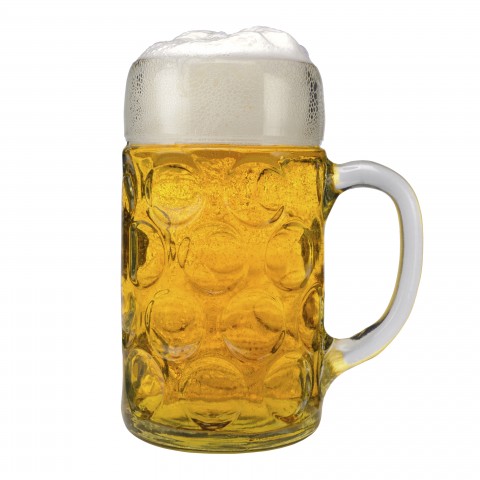
Literal translation: That’s not my beer.
English equivalent: That’s not my business.
This phrase is used when you don’t want to get involved in something you have nothing to do with. Not your beer, not your problem!
Dienst ist Dienst und Schnaps ist Schnaps.
Literal translation: Work is work and liquor is liquor.
Germans are known to be very diligent workers…but there’s no mixing of business and pleasure! Everything has its time. So work hard, play hard!
3. 6 German Proverbs Related to Nature
If you’ve been to Germany, you’ll certainly know how important it is for the locals to spend some time in touch with nature. This is reflected in the proverbs they use in their daily lives.
Bears, horses, rabbits, and forests…here we come!
Da steppt der Bär.

Literal translation: There steps the bear.
You can use this phrase when referring to a party you really want to go to. If even the bears will start dancing, it means it’s gonna be good! Be careful, though, as it’s often used sarcastically!
Wenn der Reiter nichts taugt, ist das Pferd schuld.
Literal translation: If the rider is no good, it’s the horse’s fault.
English equivalent: A bad workman always blames his tools.
Someone who has done their job poorly will always try to blame it on outside circumstances (in this case, poor horses), rather than admit their lack of skills.
Wer zwei Hasen auf einmal jagt bekommt keinen.
Literal translation: He who chases two rabbits at once will catch none.
English equivalent: He who follows two hares catches neither.
Concentrate on one task at a time, or you’ll end up not doing either of them properly.
Kümmere Dich nicht um ungelegte Eier.
Literal translation: Don’t worry about eggs that haven’t been laid yet.
English equivalent: Don’t cross your bridges before you come to them.
In other words, don’t worry about problems before they arrive. Be them eggs or bridges, just chill for now.
Du siehst den Wald vor lauter Bäumen nicht.
Literal translation: You don’t see the forest for all the trees.

This is something along the lines of the Zen proverb: “When the sage points at the moon, the fool looks at the finger.” Look beyond and see the bigger picture! And also, don’t think too much; just see what’s there, the obvious!
Bäume wachsen nicht in den Himmel.
Literal translation: No trees grow into the sky.
This German saying suggests that there are natural limits to growth and improvement. So actually, don’t reach for the sky…
4. 10 Beautifully Wise German Proverbs
This is the longest list, so let’s admit it: Germans are pretty wise. Yes, they like to be funny sometimes, enjoy their food and drink, and love to spend time in nature. But when it comes to philosophical statements, they have no rivals!
After all, German philosophers and thinkers are some of the most famous around the world. It’s easy to see why, if they’ve grown up repeating these beautiful German sayings.
Let’s look at some of these German proverbs and their meanings in English. (Although they just sound wiser spoken in German!)
Aller Anfang ist schwer.
Literal translation: All beginnings are hard.
This one is pretty self-explanatory: Beginnings can be very hard, but it will get easier.
Anfangen ist leicht, Beharren eine Kunst.

Literal translation: Starting is easy, persistence is an art.
Hmm…apparently, starting can be the easy part and keeping it up the hard bit. Let’s say it depends on the situation!
Man muss die Dinge nehmen, wie sie kommen.
Literal translation: You have to take things the way they come.
We all know life never happens exactly as we expect it to. So relax, and try to accept whatever comes. Make the best of it, rather than always wishing for things to be different.
Übung macht den Meister.
Literal translation: Practice is what makes a master.
English equivalent: Practice makes perfect.
Practice, practice, practice! It’s the only way to master virtually anything.
Wer A sagt, muss auch B sagen.
Literal translation: He who says A also has to say B.
If you commit to something, commit all the way!
Taten sagen mehr als Worte.
Literal translation: Actions say more than words.
English equivalent: Actions speak louder than words.
In German, actions don’t necessarily speak louder…they’re just more chatty!
Aus Schaden wird man klug.
Literal translation: Failure makes smart.
Nobody likes to screw up, but failure is necessary for learning. If you don’t make mistakes, you’ll never get better!
Das Billige ist immer das Teuerste.
Literal translation: The cheapest is always the most expensive.
This is a philosophical way of inviting you to invest in quality, and not only in terms of money. If something is too cheap or too easy to get, it will probably end up costing you much more later on!
Erst denken, dann handeln.
Literal translation: First think, then act.
Wise and clear. Think before you act!
Gut Ding will Weile haben.
Literal translation: Good things take time.
If you’re an impatient person, we have bad news for you. Germans believe that if you want something to be done well, you need to wait for it. In other words: take your time, enjoy the process, and don’t rush things!
5. Conclusion
“All good things must come to an end.”
But it’s not really the end, is it? There’s so much more to learn about the German language!
As they say, “Practice makes perfect.” So keep practicing your German skills on GermanPod101.com! With all the features we offer (podcasts, videos with transcriptions, word lists, a dictionary, and more), you’ll pick up this beautiful and interesting language in no time.
And remember: What makes a master? Practice, practice, practice!
Which of these German proverbs or idioms is your favorite, and why? Let us know in the comments!











